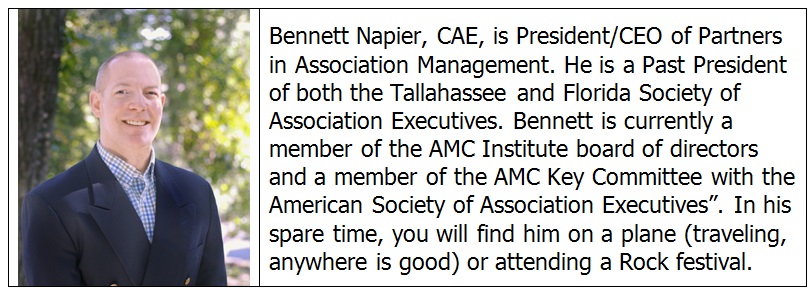By: Bennett Napier, CAE
My entire career in association management has been in the association management company arena. Working in the AMC environment, I have had the privilege to work with many associations, large and small, functional and dysfunctional and everything in between.
Regardless of structure or size, not for profits are a people business and outcomes (positive or negative) are achieved by the efforts of the people involved, both volunteers and staff.
Here are some useful but not original tips to consider. I can attest that if applied consistently and with conviction, they will achieve positive results.
Philosophy on working with the Board
- Share as much information with the board as possible and the board will let you handle the details. Succeed and the Board will let you take risks. Transparency is key.
- Be passionate about the organization’s mission; if you aren’t, why should your board be any different.
- Provide vision, but share in its ownership.
- Allow leaders to help in small and large ways, expect them to give money and time.
- When you make a mistake, own up to it, and communicate it to the appropriate leaders. Don’t try to hide the problem and try to fix it. Share what happened, show diligence to fix it and move on. Hoping that no one will figure it out if you don’t bring it to light, is a recipe for disaster for maintaining long term trust.
- Never forget who hired you and can fire you. Remember, even if you have been the executive for 20 years, it’s not your association, it’s the members!
- Work hard at every juncture. You don’t have to tell your board how hard you work, just do it and they will know.
- Don’t take things personally – In an executive role, you will likely be the conduit for complaints from the membership or non-members, on association programs or services, or just general questions of inquiry. It’s your job to handle requests/inquiries with grace.
- Don’t be surprised by any questions from members or the board. You are paid to know more than anyone else, if you don’t have the full answer, you at least need to know where and how to get it. “I don’t know” is not an acceptable answer. If you don’t know the answer, then no one does.
- Manage the association with a for-profit mentality toward growth, while maintaining its valuable non-profit status.
Working with great volunteer leaders makes association management a rewarding profession. Use these tips to make it even more enjoyable.





